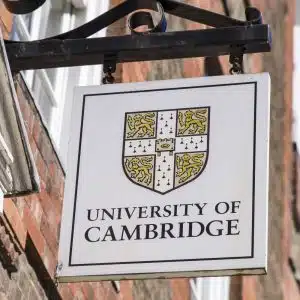The Oxford vs. Cambridge debate has been a long-standing academic and cultural discourse as old as time. They are two of the most popular and iconic universities in the world, and both constantly compete for the title of “the best.” So, what sets them apart? Is it their impressive rankings, legendary alumni, or breathtaking architecture?
In this blog, we’ll break it down for you by exploring key categories—like world rankings, subject strengths, and cost—to help you understand the real differences between Oxford and Cambridge.
- Oxford and Cambridge: Which Is Which?
- Oxford vs Cambridge: World Rankings
- Oxford vs Cambridge: Comparing Subject Strengths
- Oxford vs Cambridge: Admission Requirements
- Oxford vs Cambridge: Cost
- Oxford vs Cambridge: Location
- Oxford vs Cambridge: Bursaries and Scholarships
- Oxford vs Cambridge: Alumni
- Oxford vs Cambridge: Assessments
- Oxford vs Cambridge: The Final Verdict
- Frequently Asked Questions
- Takeaways
Oxford and Cambridge: Which Is Which?
When comparing Oxford vs Cambridge, it’s clear that both universities offer unparalleled academic excellence, rich history, and global prestige. However, each has its unique features, strengths, and atmosphere that set it apart.
University of Oxford
Oxford University, located in the historic city of Oxford, England, is one of the world’s oldest and most prestigious universities. Established in 1096, it boasts an incredible ancient campus home to 44 unique colleges and the largest library system in the UK.
With over 20,000 students, it’s a hub for learning and innovation. It attracts people from all corners of the globe—more than 40% of its students come from overseas. Oxford is particularly renowned for its programs in humanities, such as English, history, and philosophy, as well as its exceptional reputation in law, medicine, and science.
Cambridge University
Cambridge University, located in the city of Cambridge, England, is another one of the world’s oldest and most prestigious universities. Established in 1209, it’s steeped in history and tradition, making it a dream destination for students and professionals alike. Cambridge has over 150 academic departments, offering an impressive range of subjects and specializations.
If you’re into natural sciences, engineering, mathematics, or arts and humanities, this university has programs that consistently rank among the best globally. Add to that a faculty known for its expertise and dedication, and it’s no wonder Cambridge has held top spots in academic rankings for years.
Oxford vs Cambridge: World Rankings
The debate over Oxford vs Cambridge is always a hot topic among students, academics, and even university fans. Both schools are heavyweights in global rankings, consistently landing at the top. But when it comes to deciding which one is “better,” it really boils down to your perspective and what you’re looking for. So, Oxford or Cambridge? They’re both elite, no doubt about it—but let’s break it down a bit more.
| Ranking Institution | Oxford University | Cambridge University |
| QS World University Rankings 2024 | #3 | #2 |
| Times Higher Education (THE) World University Rankings 2024 | #1 | #3 |
| 2024-2025 Best Global Universities Rankings by U.S News | #4 | #6 |
| QS World University Rankings 2023 | #4 | #2 |
| Times Higher Education (THE) World University Rankings 2023 | #1 | #3 |
| QS World University Rankings 2022 | #2 | #3 |
| Times Higher Education (THE) World University Rankings 2022 | #1 | #5 |
The rankings for Oxford and Cambridge show that both universities consistently perform at the top of global league tables, though their positions vary slightly depending on the ranking organization. For 2024, Cambridge takes second place in the QS World University Rankings, ahead of Oxford at third, while Oxford dominates the Times Higher Education (THE) rankings at #1, with Cambridge in third.
Meanwhile, U.S. News places Oxford at fourth and Cambridge at sixth. Over the years, Oxford has maintained the #1 spot in THE rankings, while Cambridge has consistently outperformed Oxford in QS rankings. This variation highlights the differences in methodologies used by these ranking systems.
Oxford vs Cambridge: Comparing Subject Strengths
When it comes to the QS World University Rankings by Subject, both Oxford and Cambridge shine, making multiple appearances on the list. Here’s an interesting difference: Oxford features in 40 subjects, while Cambridge edges ahead with 41. But to really get a sense of how they differ, let’s look into their individual strengths to see what sets them apart.
University of Oxford
When it comes to Oxford vs Cambridge, Oxford University really stands out for its strength in humanities. It offers top-tier programs in subjects like Social Sciences. If you’re into science, though, keep in mind that Oxford’s science degrees aren’t as flexible as some might prefer.
Oxford’s science degrees are considered less flexible because they tend to follow a more traditional, specialized structure. Unlike some universities that offer modular programs or broader “natural sciences” degrees, Oxford generally requires students to commit to a specific subject from the start, such as Physics, Chemistry, or Biology. This means there’s less opportunity to mix and match subjects or switch paths once you’ve started.
That said, you can always explore joint degree options to combine your interests. Oxford truly shines in English Language and Literature, Geography, History, and Modern Languages—ranking first in the world for these subjects.
Cambridge University
Cambridge University is famous for its incredible Natural Sciences programs. One big perk here is the flexibility—you can mix and match biological and physical sciences to create a degree that really works for you. Plus, unlike Oxford, Cambridge lets you dive into these flexible options as an undergraduate. On top of that, Cambridge holds the top spot globally for Archaeology, History, and Mathematics, making it a powerhouse for these subjects.
Oxford and Cambridge offer a mix of similar and unique courses, but they approach teaching a bit differently. While both universities have excellent programs for learning and research, Oxford leans toward a more traditional style with lectures and one-on-one tutorials. Cambridge, however, takes a more interactive approach, featuring seminars and small group discussions.
Curious about how their courses and rankings stack up? Let’s dive into what sets Oxford vs Cambridge apart:
| Course Name | Cambridge Ranking | Oxford Ranking |
| Accounting & Finance | 6 | 4 |
| Archaeology | 1 | 2 |
| Business & Management | 8 | 9 |
| Economics | 10 | 8 |
| English Language & Literature | 2 | 1 |
| Geography | 3 | 1 |
| Mathematics | 3 | 6 |
| Medicine | 4 | 2 |
| Physics & Astronomy | 4 | 5 |
| Psychology | 4 | 3 |
Oxford vs Cambridge: Admission Requirements
Getting into either Oxford or Cambridge isn’t easy—they’re super picky about who they admit. Both universities look for top grades and impressive achievements, but that’s just the start. They also consider your personal statement, recommendation letters, and extracurriculars, like clubs or activities, to get a full picture of who you are.
The bar is set really high, so standing out is a challenge! If you’re aiming to boost your chances, a professional personal statement service can help make your application shine. When it comes to Oxford vs Cambridge, the competition is tough, but the effort is worth it.
Oxford’s admission requirements
- academic transcripts
- 2-3 letters of recommendation
- resume & personal statement
- proof of English language proficiency
- interview
- standardized test scores
- additional requirements (work experience, research proposals, etc.)
Cambridge’s admission requirements
- academic transcripts
- 1-2 references
- resume & personal statement
- proof of English language proficiency
- standardized test scores
- subject-specific written admission assessment
Oxford vs Cambridge: Cost
Oxford and Cambridge are definitely pricier compared to other universities in the UK, but don’t worry—they offer plenty of financial support to help out. If you’re an international student, your tuition fees will vary depending on your course. Living expenses, like rent, can add up quickly in these cities, but the colleges do their part to make things more affordable for students.
Make sure to plan your budget for housing, food, and books, and look into the cost of living in each area. If Cambridge is where you’re headed, it’s worth checking out student accommodation options through providers like Amber to find something that works for you.
When it comes to tuition fees, both Oxford and Cambridge charge £9,250 per year for students from the UK or EU. However, for international students, the costs vary significantly depending on the course. At Oxford, international fees range from £35,260 and £59,260 annually, while Cambridge’s fees span from £24,507 to a whopping £63,990 per year.
The variation often depends on whether you’re pursuing a humanities degree, which tends to be less expensive, or a science or medical degree, which comes with higher costs due to lab resources and specialized training.
These numbers highlight the importance of careful financial planning, especially for international students. These numbers highlight the importance of careful financial planning, especially for international students. While the fees may seem steep, it’s essential to consider what you’re getting in return—world-class education, access to extensive resources, and the prestige of an Oxford or Cambridge degree.
Both universities also offer scholarships, grants, and financial aid opportunities to help offset these costs. If you’re considering studying here, take the time to explore these options and factor in additional living expenses to create a well-rounded budget. This way, you can focus on your studies without financial worries.
Oxford vs Cambridge: Location
When comparing Oxford vs Cambridge, location is another key difference to consider. Oxford is set in a larger, livelier city with a buzzing atmosphere, while Cambridge offers a smaller, quieter vibe that feels more laid-back. The good news? Both are about the same distance from London, roughly 50-55 miles away, making them equally convenient for trips to the capital.
One more thing to think about is the geography. Oxford is surrounded by rolling hills, while Cambridge sits on a flat, low-lying coastal plain. If location plays a big role in your decision, these factors might help you figure out which university feels like the right fit for you!
Oxford vs Cambridge: Bursaries and Scholarships
One big difference between Oxford and Cambridge is the scholarships and bursaries offered by their colleges. While the UK has general options like the Chevening and Commonwealth scholarships, both universities provide their own top-tier scholarships and bursaries. These aren’t just financial aids—they’re opportunities that can truly transform your career and open up incredible doors for your future!
Oxford scholarships
If you’re considering Oxford, here are some fantastic scholarships you can apply for—ranging from fully funded to need-based options:
- Reach Oxford Scholarship. This scholarship covers course fees, a living grant, and one return airfare per year. To qualify, you’ll need an acceptance letter for a specific course at Oxford University. It’s a great option if you’re looking for comprehensive support throughout your studies.
- Hill Foundation Scholarship. Fully funded by the Hill Foundations, this scholarship covers 100% of your course fees and includes a grant for living costs. It’s awarded to students who will contribute to the Oxford scholar community and work to improve life and culture.
- Bright Oceans Corporation Scholarship. This fully funded scholarship is tailored for undergraduate students from China who show exceptional academic promise but lack the resources to fund their education. It covers both course fees and living costs.
- Palgrave Brown Scholarship. This scholarship offers an annual grant of at least £13,365 for living costs. However, if you’re pursuing a 6-year medical degree, it will only fund the first four years. It’s specifically designed for students from low-income backgrounds, funded by the Palgrave Brown Bursary Fund.
- Dr Ateh Jewel Foundation Awards. Aimed at supporting students from low-income families, this need-based scholarship provides up to £3,300 to three students. It’s generously funded by Dr. Ateh Jewel and helps make education more accessible while empowering students to achieve their dreams.
Cambridge scholarships
When it comes to scholarships, Cambridge has plenty to offer across different fields. Here’s a look at some of the most notable options available:
- Cambridge International Scholarship. If you have exceptional academic achievements and strong research skills, this scholarship might be for you. It covers the University Composition Fee and provides a maintenance allowance for one person. Selection is based purely on academic strengths, research abilities, exam results, and references.
- Aker Scholarship. This fully funded need-based scholarship is aimed at students pursuing a master’s or Ph.D. at Cambridge. While the amount varies, it’s designed to cover the full cost of study. Only 10 students are awarded this prestigious scholarship each year, making it highly competitive.
- Beit Cambridge Scholarship. This scholarship covers tuition fees, an annual stipend, and additional allowances. It’s specifically for students planning to return to their home country after completing their course. Some prior work experience is usually expected to qualify.
Oxford vs Cambridge: Alumni
Let’s get into the next chapter of the Oxford vs Cambridge rivalry—its incredible alumni. Both universities, with their rich history and academic prestige, have produced some of the most influential figures in the world. Whether it’s groundbreaking scientists, literary legends, or iconic political leaders, their alumni lists are nothing short of impressive.
Here’s a look at some of the most notable names from these prestigious institutions:
University of Oxford
- Malala Yousafzai (Activism). The youngest Nobel Prize laureate and an inspiring activist for female education.
- C.S. Lewis (Literature). Beloved author of The Chronicles of Narnia series.
- Tim Berners-Lee (Computer Science). The brilliant mind behind the invention of the World Wide Web.
- Albert Einstein (Physics). While he didn’t earn a degree from Oxford, he was honored with a doctorate for his groundbreaking contributions to physics.
- Indira Gandhi (Politics). India’s first female Prime Minister, though she didn’t complete her studies at Oxford.
Cambridge University
- Isaac Newton (Physics, Mathematics). The legendary scientist who laid the foundation for classical mechanics with his laws of motion and universal gravitation.
- Stephen Hawking (Physics). Renowned for his work on black holes and author of A Brief History of Time.
- Charles Darwin (Biology). The revolutionary thinker behind the theory of evolution by natural selection.
- Alan Turing (Computer Science). Visionary mathematician and WWII codebreaker who paved the way for modern computing.
- Emma Thompson (Acting). Academy Award-winning actress known for her incredible performances on stage and screen.
Oxford vs Cambridge: Assessments
When it comes to assessments in the Cambridge vs Oxford debate, their approaches are quite different. At Oxford, formal exams are mainly held at two key points: the end of your first year and your final year. Your performance in those final-year exams is what determines your degree classification.
Cambridge takes a different route, with assessments happening at the end of every academic year. Your final degree at Cambridge is based on the cumulative results of these yearly evaluations. So, whether you prefer fewer high-stakes exams or more consistent assessments throughout your course, this is definitely something to consider!
Oxford vs Cambridge: The Final Verdict
Choosing between Oxford and Cambridge ultimately depends on what you’re looking for in a university experience. Both institutions are world-renowned, offering exceptional academics, incredible resources, and rich traditions. Oxford has a lively city atmosphere, a slightly more traditional teaching style, and strong humanities programs, while Cambridge offers a quieter, more intimate setting with flexible science degrees and innovative teaching methods.
Rankings, alumni, scholarships, and even the location all play a part in the decision. When it comes to Oxford vs Cambridge, there’s no clear winner—it’s about finding the right fit for your goals, personality, and academic interests. Either way, you’re guaranteed a world-class education!
Frequently Asked Questions
1. Is Oxford or Cambridge better?
Neither is definitively “better”—it depends on what you value. Oxford excels in humanities and a traditional city vibe, while Cambridge is strong in sciences and offers a quieter, more flexible academic environment. Both are world-class institutions; the best choice depends on your goals and preferences.
2. Can you apply to both Oxford and Cambridge?
No, you cannot apply to both Oxford and Cambridge in the same year for undergraduate courses, except if you’re applying for an organ scholarship. For postgraduate programs, you can apply to both.
3. Which has bigger endowments between Oxford vs Cambridge?
As of 2024, the University of Oxford’s endowment is approximately £6.5 billion, while the University of Cambridge’s endowment stands at around £5.89 billion. This indicates that Oxford’s endowment is larger than Cambridge’s.
Takeaways
The longstanding debate between Oxford and Cambridge showcases how both universities excel in unique ways. They offer distinct advantages depending on your academic and personal preferences.
- Oxford stands out for its excellence in humanities and traditional subjects like English and history, while Cambridge is renowned for its flexibility in science degrees and top rankings in fields like mathematics, engineering, and natural sciences.
- Oxford’s teaching emphasizes a traditional approach with lectures and tutorials, while Cambridge takes a more interactive route with seminars and small group discussions.
- Both universities consistently rank among the top in the world, but their positions vary depending on the ranking organization.
- Need help with your college applications? Partner with the best college admissions consultant and maximize your chances of getting into the school of your dreams.











































